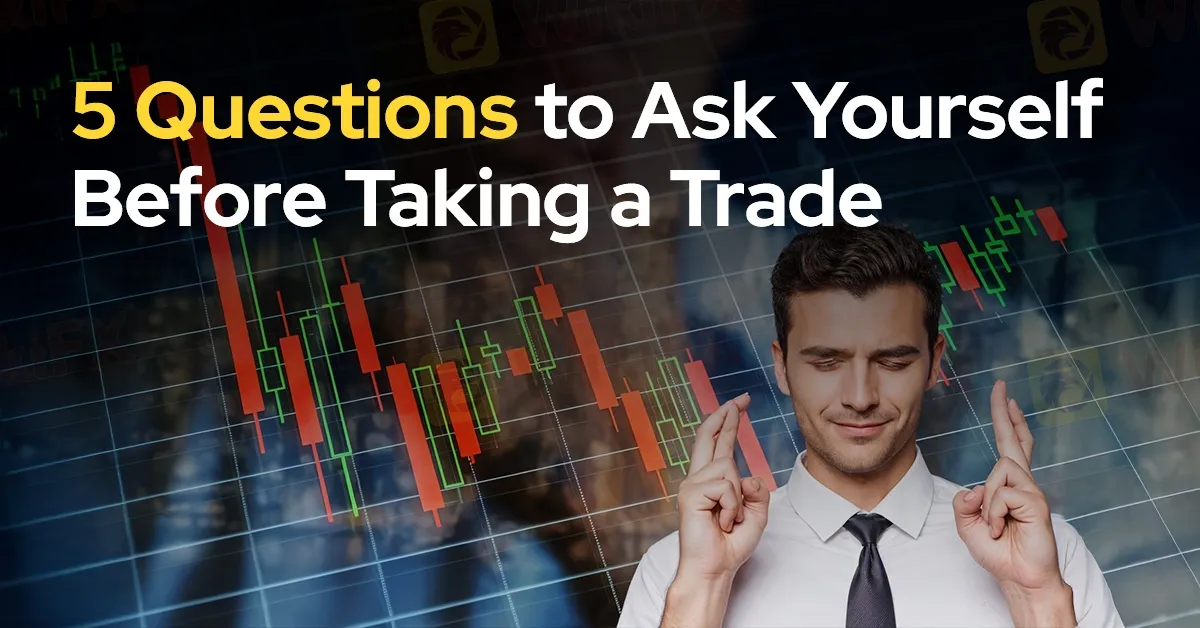简体中文
繁體中文
English
Pусский
日本語
ภาษาไทย
Tiếng Việt
Bahasa Indonesia
Español
हिन्दी
Filippiiniläinen
Français
Deutsch
Português
Türkçe
한국어
العربية
5 Questions to Ask Yourself Before Taking a Trade
Abstract:Before executing any trade, traders should pause and ask themselves critical questions to ensure they are making rational and well-informed decisions. Here are five questions to help you reflect on your strategy, manage risk, and control emotions before entering the market.

The allure of trading lies in its potential for financial gains, but the reality is that successful trading demands more than intuition or luck. It requires discipline, careful planning, and emotional control. Before executing any trade, traders should pause and ask themselves critical questions to ensure they are making rational and well-informed decisions. Here are five questions to help you reflect on your strategy, manage risk, and control emotions before entering the market.
1. Do I Have a Clear Trading Plan?
Every trade should be guided by a well-defined plan. Ask yourself if you have identified entry and exit points, set stop-loss and take-profit levels, and determined your position size. A clear trading plan helps eliminate impulsive decisions and provides structure. Without a plan, you are more likely to act on emotions, which can lead to unnecessary losses. A disciplined trader always follows their strategy, regardless of market noise.
2. Am I Prepared for the Risk Involved?
Trading is inherently risky, and no trade is guaranteed to succeed. Consider whether you are willing to accept the potential loss and how it fits within your overall risk management strategy. Experts recommend risking no more than 1-2% of your trading capital on a single trade. Ensure that the trade aligns with your risk tolerance and financial goals. Remember, trading is about preserving capital as much as it is about making profits.
3. What is My Emotional State Right Now?
Emotions are one of the biggest obstacles to consistent trading success. Before entering a trade, evaluate your mental and emotional state. Are you feeling stressed, overconfident, or desperate to recover from previous losses? Trading while emotionally unstable can lead to rash decisions and cloud your judgement. Take time to centre yourself and approach the market with a calm and focused mindset.
4. Have I Analysed the Market Thoroughly?
A hasty trade often stems from inadequate research. Reflect on whether you have conducted a thorough market analysis and checked for relevant economic or geopolitical events that could influence price movements. Understanding market conditions, trends, and technical indicators is crucial. Avoid relying on hearsay or impulsively acting on speculation. A well-researched trade is more likely to yield favourable outcomes.
5. What is My Exit Strategy?
Many traders focus solely on when to enter the market but fail to plan their exit. Ask yourself if you have a clear strategy for both winning and losing scenarios. Knowing when to exit a trade prevents you from holding onto losing positions for too long or cutting winning trades prematurely. An exit plan protects you from making decisions driven by greed or fear.

Trading requires patience, discipline, and a commitment to learning from both successes and failures. Rushing into trades without proper preparation can lead to costly mistakes. By asking yourself these five questions, you can approach the market with greater confidence and minimise emotional or impulsive actions.
Remember, trading is a marathon, not a sprint. Focusing on long-term consistency rather than short-term gains will pave the way for a more sustainable and successful trading journey.

Disclaimer:
The views in this article only represent the author's personal views, and do not constitute investment advice on this platform. This platform does not guarantee the accuracy, completeness and timeliness of the information in the article, and will not be liable for any loss caused by the use of or reliance on the information in the article.
Read more

Malaysian-Thai Fraud Syndicate Dismantled, Millions in Losses Reported
The Royal Malaysia Police (PDRM) has received 26 reports concerning the Nicshare and CommonApps investment schemes, both linked to a major fraudulent syndicate led by a Malaysian citizen. The syndicate’s activities came to light following the arrest of its leader by Thai authorities on 16 December.

Top 10 Trading Indicators Every Forex Trader Should Know
Master the top 10 Forex trading indicators to analyze real-time Forex quotes, trends, and market signals. Learn strategies to boost accuracy and avoid mistakes.

Why Do You Feel Scared During Trade Execution?
Trade execution is a pivotal moment for traders. It is when analysis turns into action, and potential profits or losses become reality. However, for many traders, this moment is accompanied by fear. Why does this happen, and how can you address it?

WikiEXPO Global Expert Interview: Simone Martin—— Exploring Financial Regulation Change
In the midst of financial innovation and regulation, WikiGlobal, the organizer of WikiEXPO, stays abreast of industry trends and conducts a series of insightful and distinctive interviews on pivotal topics. We are delighted to have the privilege of inviting Simone Martin for an in-depth conversation this time.
WikiFX Broker
Latest News
Geopolitical Events: What They Are & Their Impact?
Top 10 Trading Indicators Every Forex Trader Should Know
ASIC Sues Binance Australia Derivatives for Misclassifying Retail Clients
WikiFX Review: Is FxPro Reliable?
Malaysian-Thai Fraud Syndicate Dismantled, Millions in Losses Reported
Trading frauds topped the list of scams in India- Report Reveals
Why Do You Feel Scared During Trade Execution?
WikiFX Review: Something You Need to Know About Markets4you
Revolut Leads UK Neobanks in the Digital Banking Revolution
Fusion Markets: Safe Choice or Scam to Avoid?
Currency Calculator


